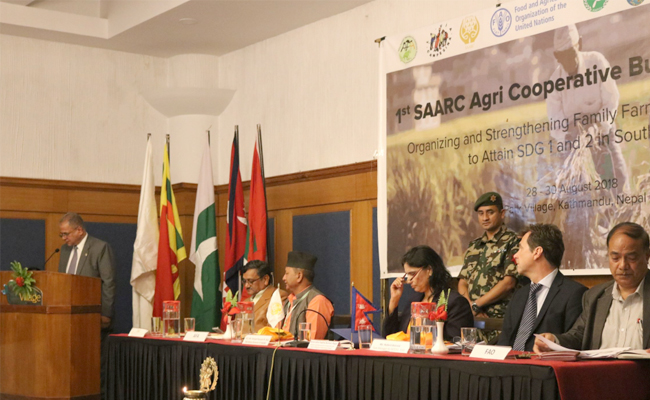 H. E. Mr. Amjad Hussain B. Sial, Secretary General of the South Asian Association for Regional Cooperation (SAARC) addressed the First SAARC Agri Cooperative Business Forum in Kathmandu this morning, 28 August, 2018.
H. E. Mr. Amjad Hussain B. Sial, Secretary General of the South Asian Association for Regional Cooperation (SAARC) addressed the First SAARC Agri Cooperative Business Forum in Kathmandu this morning, 28 August, 2018.
Devoted to the theme, Organizing and Strengthening Family Farmers’ Cooperatives to attain SDG-1 and SDG-2 in South Asia, the Forum was co-organized by Food and Agriculture Organization of the United Nations (FAO) and Asian Farmers’ Association (AFA) with the support from International Fund for Agricultural Development (IFAD).
The three-day Forum brings together representatives both from the government and non-governmental entities from the Member States of SAARC as well as from regional and international organizations. It will conclude on 30 August 2018.
Addressing the Inaugural Session of the Forum, the Secretary General said, “South Asia is home to around a quarter of the global population, majority of whom live in the rural areas and depend on natural resources like land, freshwater, coastal fisheries, and forests.
Much of the agricultural production in the region is undertaken by smallholders with very small landholdings, while women play a significant role in agriculture.” He added, “In the context of diminishing farm sizes, sustainable Family Farmers’ Cooperatives can play an instrumental role in achieving food security, improving nutrition and developing value chain, eventually contributing to poverty alleviation and ending hunger.”
Referring to the SAARC Agriculture Vision 2020 adopted by the SAARC Agriculture Ministers in 2008, the Secretary General said, “Small-sized farms in South Asia face serious constraints in adopting modern technology and in marketing their produce. To some extent, the size disadvantage can be obviated through contract and cooperative farming.”
In his statement, Mr. Sial also made a reference to the Declaration of the Eighteenth SAARC Summit, in which, SAARC leaders, inter alia, recognized the potential of Cooperatives in “achieving inclusive, broad-based and sustainable economic growth and development,” and called for “sharing of experiences, expertise and best practices in this sector.” He stated that following the inclusion of Cooperatives as an agreed area of cooperation, an intergovernmental process is underway for finalizing the SAARC Plan of Action for cooperation in matters relating to Cooperatives.
In concluding his remarks, he said, “Agricultural Cooperatives can be an effective instrument in tackling the formidable challenge of poverty in the SAARC region. Reaching out to the marginalized segments of the society, Cooperatives can help in employment generation by encouraging small and medium enterprises in communities.
Women and the vibrant youth population, with proper awareness and education on agriculture cooperatives, could also be utilized in the poverty eradication programmes in the region.
”
Press release issued by the SAARC Secretariat, Kathmandu, 28 August 2018.
